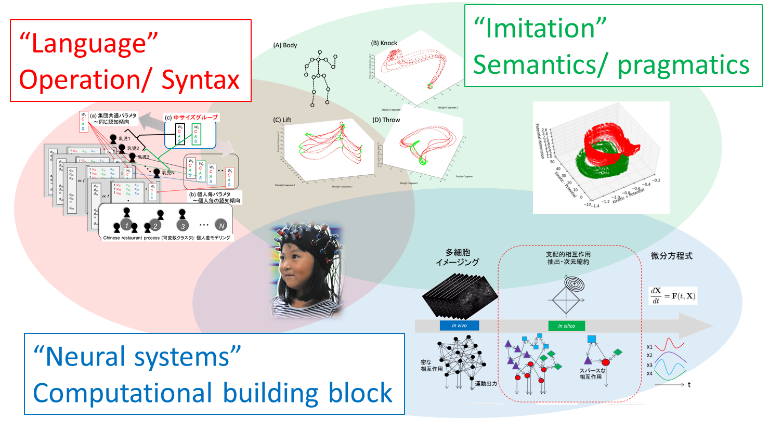
Understand cognition to create an intelligent system, and build an intelligent system to understand cognition.
Laboratory on Computational Cognitive Science
Associate Professor:HIDAKA Shohei
E-mail:
[Research areas]
Cognitive Science, Artificial Intelligence
[Keywords]
Semantic cognition, understanding, learning, language, embodied cognition, imitation, communication
Skills and Background we are looking for in Prospective Students
The lab member is expected to have his/her own curiosity to explore human cognition and willingness to work on something unknown. In addition, some basic knowledge on mathematics/ programming such as linear algebra, statistics, or machine learning, skill of psychological experiments or English literacy will you start your project smoothly.
What you can expect to learn in this laboratory
In our lab, we build a theory/model or run a questionnaire survey or psychological experiment to understand human cognition. In general, cognitive processes are typically not directly observable, and thus it is crucial to build and test a hypothesis, model, or theory through experiments. Through such research activity, you would learn a sort of techniques, such as statistical modeling and machine learning, and logical thinking capability to design empirical experiments. Such learning experience would be also beneficial to non-research activity after you are employed in a commercial company to collaborate with your colleagues in various contexts.
【Job Category of Graduates】 Software engineer, R & D, academic researcher
Research Outline
Toward understanding semantic cognition
Almost every creative activity including scientific research is involved with human cognition. “Cognition” means mental process and its functioning, and human cognition plays a central role to understand and create something which develops our society. The goal of our lab is to understand semantic cognition – how we make sense of something. Our research area is related to cognitive science, artificial intelligence, and neuro science.
Understanding cognition and building AI
In cognitive science, an aspect of cognitive processes is viewed as an information process, and a certain algorithm is built to achieve a given requirement. Namely, we take an approach to build an intelligent system for understanding of a certain aspect of cognition. In this approach, the following two ways are like two faces of the same coin:
(a) Create a new intelligent system by understanding human cognition
(b) Understand an unknown aspect of cognition by mimicking it by existing intelligent systems.

Three lines of our research
Specifically, our lab works on the three main topics in the figure at right hand side.
(1) Language development and learning
(2) Embodied cognition and intention inference
(3) Fundamental computational theory of understanding
Key Publications
- Torii, T. & Hidaka, S. (2021). Completion of the infeasible actions of others: Goal inference by dynamical invariant. Neural Computation. 33 (11): 2996–3026.
- Hidaka, S. & Torii, T. (2021). Designing bivariate auto-regressive timeseries with controlled Granger causality. Entropy. 23(6), 742.
- Hidaka, S & Oizumi, M (2018). Fast and exact search for the partition with minimal information loss. PLoS ONE 13(9): e0201126.
Equipment
Motion capture (VICON)
Eye tracker (Tobii)
Functional near-infrared spectroscopy (fNIRS; Hitachi)
Teaching policy
We respect to your own motivation, and ask you to set and work on some research project with your own interest. Our lab activity includes presentation and discussion in a regular lab meeting and the other informal one such as tea time. We encourage and financially support you to submit your research paper to domestic or international conferences, if your project met a certain criterion.
[Website] URL:https://www.jaist.ac.jp/ks/labs/shhidaka/